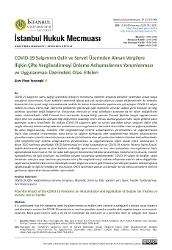| dc.contributor.author | Yazıcıoğlu, Alara Efsun | |
| dc.date.accessioned | 2021-01-28T12:29:46Z | |
| dc.date.available | 2021-01-28T12:29:46Z | |
| dc.date.issued | 2020 | |
| dc.identifier.issn | 2636-7734 | en_US |
| dc.identifier.issn | 2667-6974 | en_US |
| dc.identifier.uri | https://hdl.handle.net/20.500.12469/3783 | |
| dc.identifier.uri | https://doi.org/10.26650/mecmua.2020.78.2.0021 | |
| dc.identifier.uri | https://search.trdizin.gov.tr/yayin/detay/396476 | |
| dc.description.abstract | It is undisputed that the measures taken by governments to enable their citizens to safeguard a certain social distance and thereby to contain the COVID-19 pandemic as much as possible caused a considerable negative impact on economic activities. Most governments took a series of immediate tax measures at a domestic level to mitigate that impact. Traditionally, large-scale economic problems, such as the ones that have resulted from the COVID-19 pandemic, give rise not only to domestic law and tax policy modifications but also to several legal and policy amendments at regional and international levels. The most recent example is the financial crisis of 2008. Following the crisis concerned, among other developments, the implementation of a Europe-wide Financial Transaction Tax was suggested and international exchange of information gained unprecedented importance, which resulted in significant international efforts in that particular area that are still ongoing. This article focuses on the potential impact of COVID-19 on interpretation and application of double tax treaties on income and on capital. To this end, problems that may occur concerning interpretation and application of double tax treaties are analyzed and then the current status of the international tax law projects, which were already ongoing before the COVID-19 crisis, relating to a potential update of such treaties is briefly examined. Most of the problems that may occur due to the pandemic in a double tax treaty context were analyzed in a document entitled "OECD Secretariat Analysis of Tax Treaties and the Impact of the COVID-19 Crisis" published by the OECD Secretariat on April 3, 2020. The residency of natural and legal persons, the creation of a permanent establishment, and the taxation of income earned by cross border workers were examined in the document concerned. Although it was not possible for the Secretariat to clarify issues relating to transfer pricing, that particular field is also in need of, and prone to, important developments. COVID-19 pandemic gave rise to some doubt on the progress of the ongoing work on double tax treaties, such as the work that is being conducted on the digitalization of the economy. The projects concerned continue at their regular pace, without any significant delay, as per the statement made by the OECD. | en_US |
| dc.language.iso | tur | en_US |
| dc.publisher | Istanbul Univ | en_US |
| dc.rights | info:eu-repo/semantics/openAccess | en_US |
| dc.subject | COVID-19 | en_US |
| dc.subject | Double tax treaty | en_US |
| dc.subject | Residence | en_US |
| dc.subject | Permanent home | en_US |
| dc.subject | Place of effective management | en_US |
| dc.subject | Permanent establishment | en_US |
| dc.subject | Transfer pricing | en_US |
| dc.subject | Cross border workers | en_US |
| dc.title | Potential Impact of the COVID-19 Pandemic on Interpretation and Application of Double Tax Treaties on Income and on Capital | en_US |
| dc.type | article | en_US |
| dc.identifier.startpage | 935 | en_US |
| dc.identifier.endpage | 960 | en_US |
| dc.relation.journal | Istanbul Hukuk Mecmuasi | en_US |
| dc.identifier.issue | 2 | en_US |
| dc.identifier.volume | 78 | en_US |
| dc.department | Fakülteler, Hukuk Fakültesi, Özel Hukuk Ana Bilim Dalı | en_US |
| dc.identifier.wos | WOS:000581833600021 | en_US |
| dc.identifier.doi | 10.26650/mecmua.2020.78.2.0021 | en_US |
| dc.institutionauthor | Yazıcıoğlu, Alara Efsun | en_US |
| dc.relation.publicationcategory | Makale - Uluslararası Hakemli Dergi - Kurum Öğretim Elemanı | en_US |
| dc.identifier.trdizinid | 396476 | en_US |
















